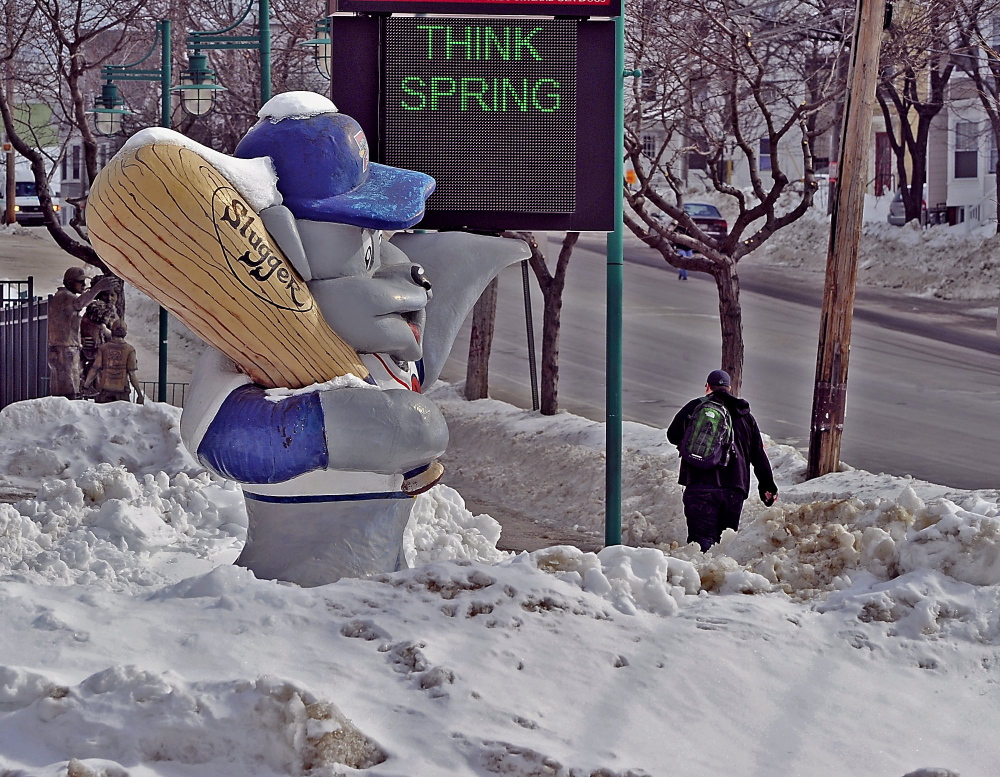So you think Maine’s having a miserable winter?
Well, the science would back you up.
Portland is experiencing a “severe” winter, according to a winter intensity tracker that’s been dubbed the “winter misery index.”
The index developed by a National Weather Service meteorologist is based on how much snow and freezing weather a city experiences compared to historical trends in that city.
So far, this winter has been the 16th-most severe winter in Portland in the last 64 years, according to National Weather Service data obtained by the Associated Press. It has been significantly more severe than the 64-year average for Portland, and it’s been especially severe compared to the recent string of milder winters in the last decade.
On the other hand, it’s far from the most miserable winter ever in Portland and not severe enough to qualify as an “extreme” winter – the most miserable category of all.
Portlanders who endured the winter of 1970-71 or 1981-82 know the real meaning of winter misery.
The people with the most right to complain this winter? They live in Detroit, which is enduring its most miserable winter since the 1950s.
Sure Chicago, Indianapolis and Philadelphia and Moline, Ill., are in the midst of their third-most extreme winters in more than 60 years. But Detroit, a city that is trying to crawl out of bankruptcy, is also slogging through what so far is the most extreme winter it has had since Harry Truman was president, according to the index.
So far Detroit has had more than 6 1/2 feet of snow and 100 days when the thermometer plunged below the freezing mark. Of two dozen cities studied, Detroit alone is in the middle of its harshest winter since 1950.
In better weather, downtown Detroit’s riverfront walk bustles with bicyclists, runners, walkers and people watchers. Lunchtime on Tuesday wasn’t better weather. With temperatures in the low 20s and a biting wind, Paul Welch was practically alone on his 2-mile trek. He was mostly dressed for the weather, with a fleece pullover, ski jacket and gloves – but no hat. Consequently, his face was pink.
“My ears are freezing,” said Welch, 52, who works nearby at Blue Cross Blue Shield of Michigan’s headquarters. “I didn’t think it was going to be quite this windy when I got out here but … I found out, yeah, it’s pretty bad.”
Barbara Mayes Boustead., a former Detroit-area resident who now works in Omaha, Neb., created the index a couple years ago to judge the severity of winters. Omaha, by the way, is the only city in two dozen metro areas that Boustead examined that is not having an “extreme” or “severe” winter. It’s merely average.
Boustead uses daily high and low temperatures and daily and accumulated snowfall to come up with a winter index that’s equivalent to the way meteorologists categorize hurricanes and tornadoes. Officially, it is called the Accumulated Winter Season Severity Index.
“I personally would call this a misery index,” said Boustead.
But to co-creator Steve Hilberg, the index measures “awesomeness.”
“I embrace winter rather than hating it,” said Hilberg, a meteorologist who works at the Midwest Regional Climate Center in Champaign, Ill.
New York, Milwaukee and Duluth are in the midst of their fourth harshest winters. Also having top-10 harshest winters are Minneapolis-St. Paul in Minnesota; Louisville, Ky.; Sault Ste. Marie, Mich., and Cheyenne, Wyo.
The idea is to put winter in context. This winter seems unusually harsh because it has been a while since the late 1970s and early 1980s when severe winters were far more frequent. People have short memories.
Plus, for almost three-quarters of the places studied the winter of 2011-2012 was the mildest on record, Boustead said.
But why Detroit?
Just bad geography and luck. Much of the cold and snow this winter is because of a change in the jet stream that has funneled frigid air south from the Arctic “right down the alley” through Detroit, Hilberg said.
The winter index keeps going, until the cold, snowy weather stops. And that’s at least a couple weeks away, according to forecasts.“We’re going to push that index a little bit higher,” Boustead said. “Let’s see how much higher we can go.”
Send questions/comments to the editors.



Success. Please wait for the page to reload. If the page does not reload within 5 seconds, please refresh the page.
Enter your email and password to access comments.
Hi, to comment on stories you must . This profile is in addition to your subscription and website login.
Already have a commenting profile? .
Invalid username/password.
Please check your email to confirm and complete your registration.
Only subscribers are eligible to post comments. Please subscribe or login first for digital access. Here’s why.
Use the form below to reset your password. When you've submitted your account email, we will send an email with a reset code.